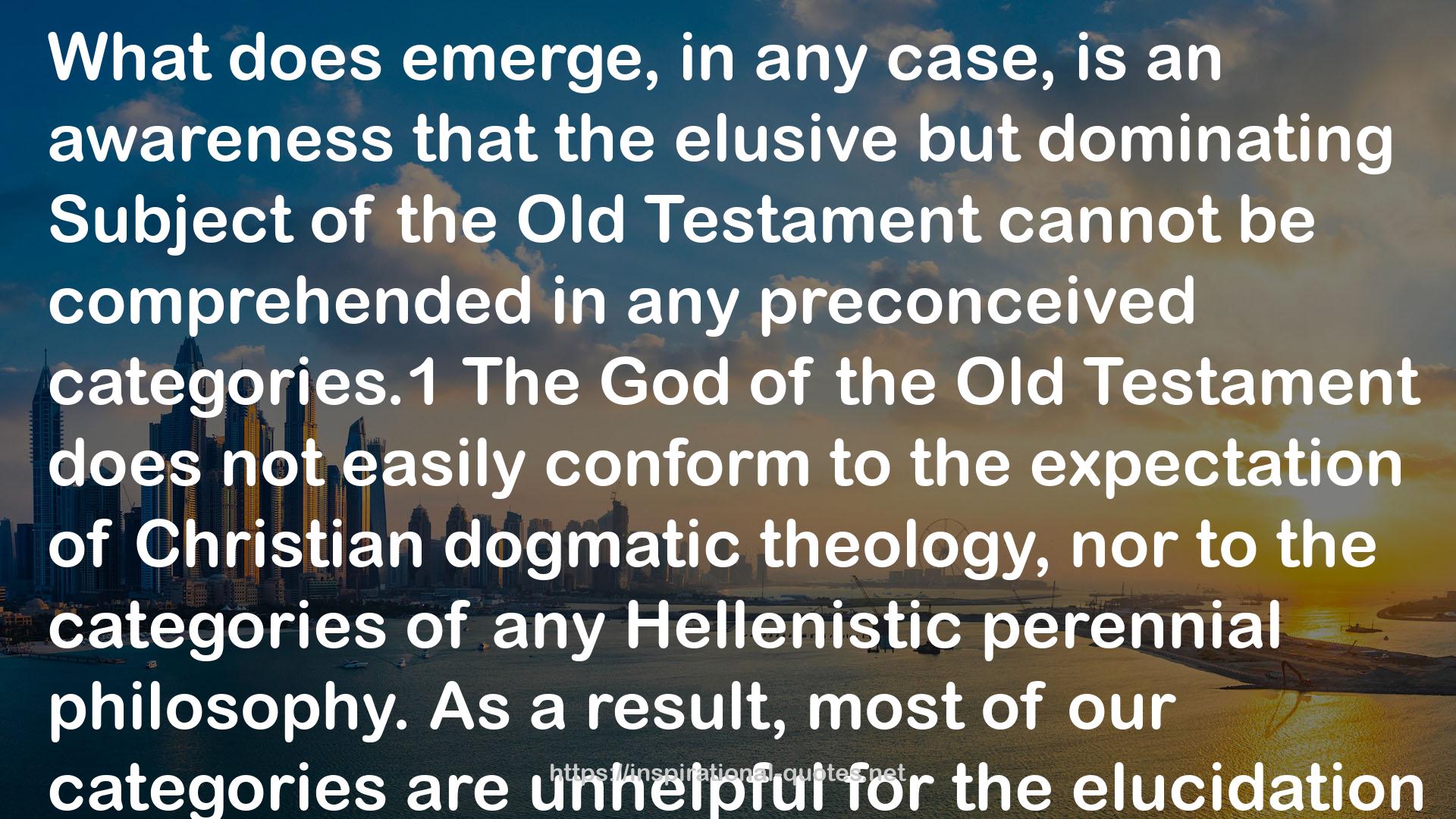1
" What does emerge, in any case, is an awareness that the elusive but dominating Subject of the Old Testament cannot be comprehended in any preconceived categories.1 The God of the Old Testament does not easily conform to the expectation of Christian dogmatic theology, nor to the categories of any Hellenistic perennial philosophy. As a result, most of our categories are unhelpful for the elucidation of this Subject, and we shall have to proceed concretely, a text at a time, a detail at a time. The Character who will emerge from such a patient study at the end will still be elusive and more than a little surprising. "
― Walter Brueggemann , Theology of The Old Testament: Testimony, Dispute, Advocacy
2
" [I]n 1955, Klaus Koch proposed a construct of “deeds-consequences,” wherein he argued that the very structure of most sayings in the Book of Proverbs (and elsewhere in the Old Testament) assumed and affirmed that human deeds have automatic and inescapable consequences, so that acts for good or for ill produce their own “spheres of destiny.” The critical point in Koch’s argument is that in “foolish acts” - acts that violate Yahweh’s righteousness - Yahweh does not need to intervene directly in order to punish or reward, as in the covenant blessings and curses of Sinai. Rather, the deed carries within it the seed of its own consequence, punishment or reward, which is not imposed by an outside agent (Yahweh). Thus, for example, a lazy person suffers the consequence of poverty, without the instrusion of any punishing agent; likewise, carelessness in choosing friends will produce a life of dissolution, all on its own. Consequently, “responsible acts” - those that cohere with Yahweh’s ordering of creation - will result in good for self and for community. Yahweh is not at all visible in this process. But, according to Israel, Yahweh is nonetheless indispensable for the process. This is not, in Israel’s horizon, a self-propelled system of sanctions, but it is an enactment of Yahweh’s sovereign, faithful intentionality. "
― Walter Brueggemann , Theology of The Old Testament: Testimony, Dispute, Advocacy
3
" the threat of life, so palpable among us, is a threat that can and will be countered by the Creator who continues the work of governance, order, and sustenance. Creation faith is the summons and invitation to trust the Subject of these verbs, even in the face of day-to-day, palpable incursions of chaos. The testimony of Israel pushes toward a verdict that the One embedded in these doxological statements can be trusted in the midst of any chaos, even that of exile and finally that of death. "
― Walter Brueggemann , Theology of The Old Testament: Testimony, Dispute, Advocacy
7
" Historical criticism is reflective of a certain set of epistemological assumptions that go under the general terms objective, scientific, and positivistic, assumptions that sought to overcome the temptations of fideism. These epistemological assumptions no longer command the field uncritically in any serious intellectual endeavor, and Scripture interpretation cannot naively persist in such a notion of knowledge.112 Insofar as historical criticism reflects the assumptions and interest of modernity and the Enlightenment’s declaration of war on church tradition, historical criticism served to fend off any objectionable supernaturalism in the text and to explain away whatever was considered, by the norms of modernity, to be odd in the text. "
― Walter Brueggemann , Theology of The Old Testament: Testimony, Dispute, Advocacy
8
" It is the work of a witness to present a coherent narrative account of what happened, or to provide materials out of which a coherent narrative account may be constructed. It is the work of a witness to tell the truth. The witness necessarily purports to tell the truth, and may indeed be telling the truth. The court, moreover, may accept the rendering of reality given by the witness as true. Or the witness may be engaged in deception or in self-deception. The witness may be engaged in a form of truth-telling that appears to be inadequate. It is the work of the court to test the adequacy of the witness’s version of reality. This testing is done through the process of cross-examination, whereby the court probes the testimony of the witness in order to inquire into its adequacy, coherence, credibility, and congruence with other evidence. If the testimony is found to be not adequate, or not credible, or not coherent, or not congruent, the court is likely to reject the testimony as an unreliable rendering of reality.
I propose that the process of cross-examination is required of Israel’s daring testimony, which attests to “mighty acts” whereby Yahweh transforms the world. Moreover, the process of cross-examination seems to go on in the Old Testament text itself, the text being pervasively disputatious. [...] It is remarkable that the process of cross-examination goes on in the Old Testament itself, partly in the utterance of Israel and partly in the alleged utterance of non-Israelites. As a consequence, the cross-examination constitutes part of the record of testimony, and it is understood in Israel as a way in which the testimony itself must be undertaken. "
― Walter Brueggemann , Theology of The Old Testament: Testimony, Dispute, Advocacy

